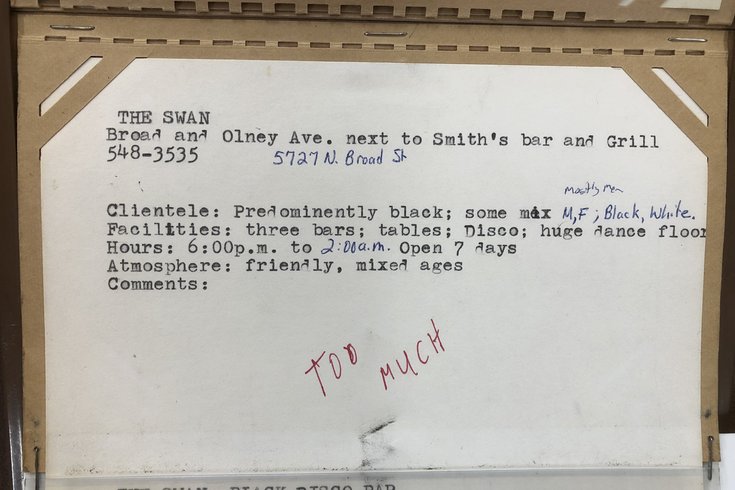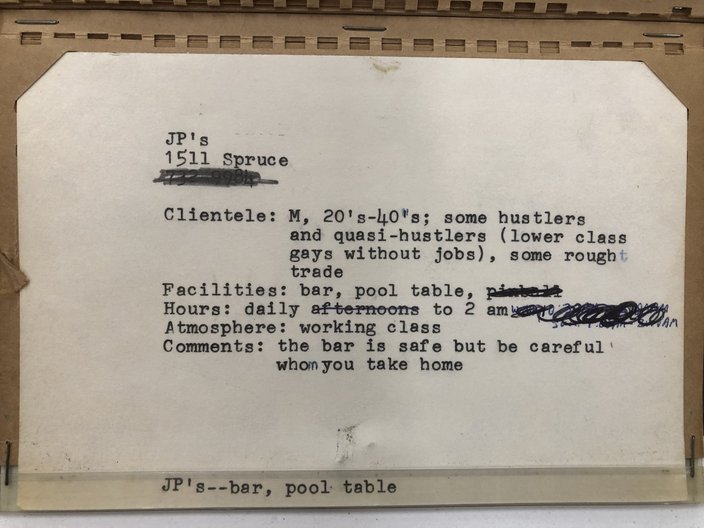
June 28, 2024
 Provided image/John J. Wilcox, Jr. Archives
Provided image/John J. Wilcox, Jr. Archives
The Gay and Lesbian Switchboard of Philadelphia maintained a directory of LGBT organizations and businesses. The entries included details on clientele, and occasionally blunt comments like the one above.
In the 1970s, finding gay bars or doctors accepting of LGBTQ patients was risky business. Establishments geared toward an LGBTQ clientele often could not openly advertise, and asking around meant outing yourself to potentially hostile confidantes. But in the evenings, queer Philadelphians could turn to one resource: a confidential hotline that shared information and referrals.
The Gay and Lesbian Switchboard of Philadelphia was a free, volunteer-run service run out of various apartments and, eventually, LGBT community centers between 1973 and 1998. Operators worked off a card file of vetted businesses — think a Rolodex, but laid flat and bound like a book — making recommendations based on the caller's question.
"I can surmise that it was a needed service," said John Anderies, the director of the John J. Wilcox, Jr. Archives at the William Way LGBT Center. "Back then, it was difficult, I think, for people in the community to know how to find out about organizations or events. I'm told that at the time it wasn't possible for gay bars to advertise in the Yellow Pages in the phone book. So where do you go to find out about these places unless you're already in the know?"
Philadelphia wasn't the only city with this switchboard. There was already a similar service in New York when Philly's began, and others followed in London, Houston, Harrisburg and Charlotte, North Carolina. The earliest examples emerged at a time when many LGBT organizations were just forming, the riots at Stonewall fresh in everyone's minds.
Keith Clark, the editor and co-owner of Philadelphia Gay News, started the switchboard in his Green Street apartment in 1972, but it did not begin accepting callers until Feb. 19, 1973. Volunteers staffed the multi-line phone most evenings from 6 p.m. to midnight, give or take an hour. Since the calls were free, the switchboard covered its operating costs through a patchwork of fundraisers at bars and skating parties, as well as direct contributions. Staffers also advertised the switchboard at those bars and parties, passing out flyers and business cards with the phone number.
The Gay Switchboard of Philadelphia, as it was originally called, launched with just 20 cards in its directory, but those numbers grew over time. Now housed at the Wilcox Archives, the card file contains a wide range of businesses and services. Queer campus groups, softball teams (like the Masterbatters) and motorcycle clubs are all listed alongside support groups for lesbian mothers and peer counseling services. Welcoming religious spaces, like Presbyterians for Gay Concerns and the Catholic organization Dignity, also appear.
Bars, including the Gayborhood staple Woody's, took up substantial space in the directory. The cards would note details like the hours, atmosphere and typical clientele — and the people writing them did not hold back.
"There's one card which is my favorite. It's a bar called JP's," Anderies said. "It sort of gives a warning that there might be hustlers there. So male sex workers. But then it goes on to say hustlers or quasi-hustlers and then in parentheses it defines this as 'lower class gays without jobs.' And I'm just like, oh my God, someone's biases are just written in big, bright letters there."
The directory entry for JP's bar at 1511 Spruce St.
Though the switchboard operated primarily as an information hub, volunteers occasionally got tougher calls. Sometimes people called asking how to know they were gay, or how to come out. Others reached out in desperation. The operators typically underwent 5-6 training sessions prior to their first shifts to give them the tools to handle cries for help.
"They certainly weren't certified to be counselors or anything like that, but they were trained with the understanding that they might get things like suicide calls," Anderies said. "At the time in Philly, there were LGBT mental health organizations, so people would've gotten referred to those. But I do think that they wanted to be prepared if someone reached out in a moment of crisis."
The switchboard bounced around numerous homes over its 25 years in existence, sharing space at points with the Eromin Center, a mental health service, and the Gay Coffee House, a performance venue in Old City. It finally settled into the William Way LGBT Center's current building on Spruce Street, where it disbanded in the late '90s.
Although, as Anderies joked, "they just left all their stuff" at the center, providing heaps of archival material, it's unclear why the switchboard hung up. The burgeoning internet surely swiped some of their calls. But increasing queries about HIV/AIDS also might have overwhelmed the volunteers, and the organization was constantly in flux.
"They kept minutes of their meetings, and it did seem like there were times when it was really well-run and well-organized, and then times when it was really poorly done," he said. "It's not so surprising that a small organization of volunteers would go through ups and downs like that. But it does seem like things got really disorganized right toward the end."
The Gay and Lesbian Switchboard of Philadelphia might not make sense in 2024 — or at least as much sense as it did in the days before Google — but for decades, it gave people a way to find community. For Anderies, its worth is illustrated by a common scene outside one of the businesses listed in the directory: Giovanni's Room, Philadelphia's long-running gay bookstore.
"Tom Wilson Weinberg, who was one of the three people who founded Giovanni's Room bookstore, talks about how when they first opened up in 1973 on South Street, they would notice someone come to the window, look in the window at the books, sort of peer in, but not come in," Anderies said. "And then they would come back a little later, peer in and again, not come in. It was really clear that people were really working up the courage to go into this gay bookstore and fearful of someone seeing them or finding them there.
"So I imagine, depending on how comfortable you were, it could be really challenging to find like-minded people or a place to go on Friday night."
Correction: This article previously stated that the card for The Swan, a former disco club on 5727 N. Broad St., included the blunt commentary "TOO MUCH." This was actually the new name of the establishment.
Follow Kristin & PhillyVoice on Twitter: @kristin_hunt
| @thePhillyVoice
Like us on Facebook: PhillyVoice
Have a news tip? Let us know.
 Provided image/John J. Wilcox, Jr. Archives
Provided image/John J. Wilcox, Jr. Archives